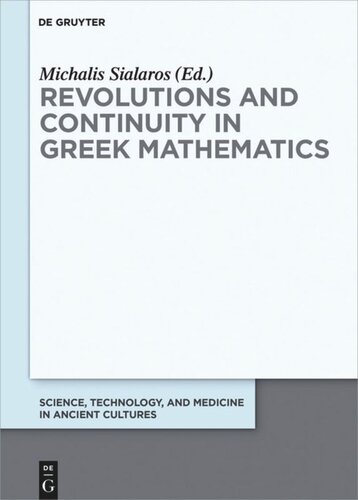

Most ebook files are in PDF format, so you can easily read them using various software such as Foxit Reader or directly on the Google Chrome browser.
Some ebook files are released by publishers in other formats such as .awz, .mobi, .epub, .fb2, etc. You may need to install specific software to read these formats on mobile/PC, such as Calibre.
Please read the tutorial at this link: https://ebookbell.com/faq
We offer FREE conversion to the popular formats you request; however, this may take some time. Therefore, right after payment, please email us, and we will try to provide the service as quickly as possible.
For some exceptional file formats or broken links (if any), please refrain from opening any disputes. Instead, email us first, and we will try to assist within a maximum of 6 hours.
EbookBell Team

5.0
50 reviewsThis volume brings together a number of leading scholars working in the field of ancient Greek mathematics to present their latest research. In their respective area of specialization, all contributors offer stimulating approaches to questions of historical and historiographical ‘revolutions’ and ‘continuity’. Taken together, they provide a powerful lens for evaluating the applicability of Thomas Kuhn’s ideas on ‘scientific revolutions’ to the discipline of ancient Greek mathematics. Besides the latest historiographical studies on ‘geometrical algebra’ and ‘premodern algebra’, the reader will find here some papers which offer new insights into the controversial relationship between Greek and pre-Hellenic mathematical practices. Some other contributions place emphasis on the other edge of the historical spectrum, by exploring historical lines of ‘continuity’ between ancient Greek, Byzantine and post-Hellenic mathematics. The terminology employed by Greek mathematicians, along with various non-textual and material elements, is another topic which some of the essays in the volume explore. Finally, the last three articles focus on a traditionally rich source on ancient Greek mathematics; namely the works of Plato and Aristotle.